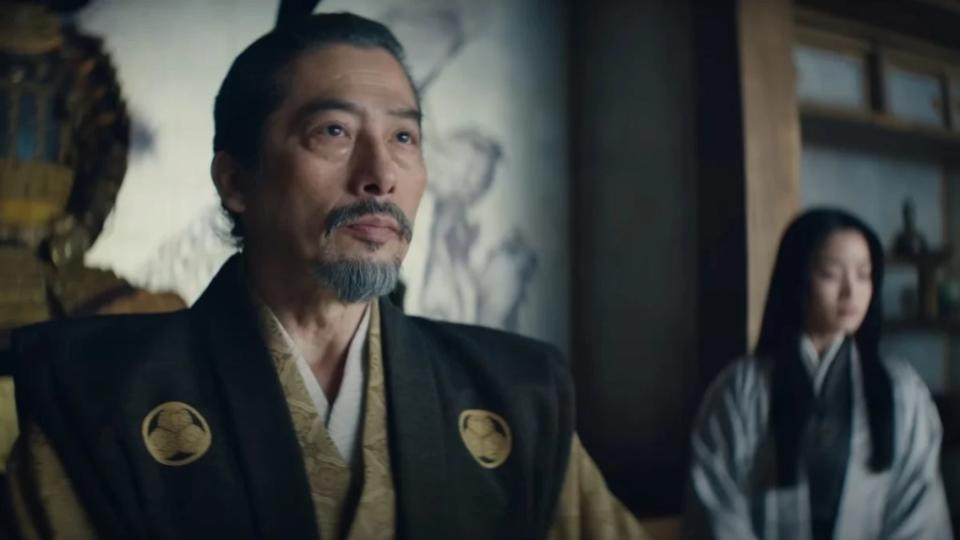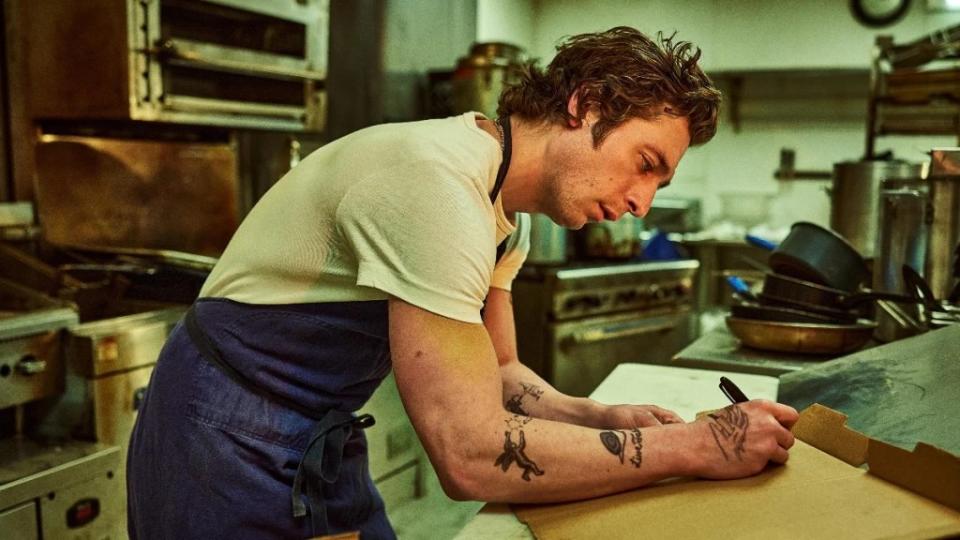FX Boss John Landgraf Explains How Peak TV Changed Consumer Expectations ‘Forever’
- Oops!Something went wrong.Please try again later.
You are reading an exclusive WrapPRO article for free. Want to level up your entertainment career? Go here for more information.
In 2016, FX head John Landgraf labeled the era of seemingly never-ending high-quality television as “Peak TV.” Eight years and several (incorrect) predictions about its demise later, the chairman of FX Networks believes we’ve finally reached the end of this phenomenon.
During the network’s executive session at the Television Critics Association’s 2024 winter tour, Landgraf revealed that the amount of adult scripted series released in 2023 had dropped by 14%, the first major decline since the COVID-impacted 2020. Though some of this slump may be credited to the WGA and SAG-AFTRA strikes, Landgraf doesn’t believe those labor developments are entirely to blame. Peak TV has peaked. And it’s completely changed the industry in its wake.
From rumors of Disney ditching its linear assets to the rising cost of television and the quality expectations from audiences, Landgraf sat down with TheWrap to discuss how FX and the industry at large is still changing during this tumultuous time.
TheWrap: With Disney’s Charter Communications dispute, a couple of FX channels, including FXM and FXX, have been removed. Has that impacted the brand? How are you thinking about that?
John Landgraf: It doesn’t change anything about the brand. When we started, 100% of the financing for the shows was coming from the linear channels and 100% of the consumption. In fact, I was just on the phone with Noah Hawley taking him through the five seasons of “Fargo.” One hundred percent of “Fargo’s” viewership for Seasons 1, 2 and 3 were on linear channels, the VOD system. In Season 4, it was 27% Hulu, 73% TV. Season 5 it’s 55% Hulu, 45% linear. The linear uses will stop because it doesn’t stay in the VOD system after 35 days, whereas the Hulu consumption will continue. So that 55% becomes 60% and 65% and 70%. Then the financing, which was all channel and no streaming, right now is probably about equal balance. Someday it’ll be almost all streaming.
I know there’s been talk about Disney selling linear assets. Is that a concern? Have you had any conversations about that?
It’s not a concern for me. It’s also not my decision, but it’s not something that we’re worried about.

To follow up, at this point would you consider your part of the FX business the studio side of things?
Yeah, we call it a brand. A studio can be a supplier that will make every single kind of programming, just like a streaming platform might be a buyer that buys every single type of programming. Marvel is a studio, LucasFilm is a studio, Pixar is a studio, Disney Animation is a studio that has a very specific ethos and vibe.
The thing that has made HBO very successful for a long time, and it’s something we really imitate [at FX], they’re not just a channel that buys things and puts them on the air. They make things. They are a studio. The studio develops things in relation to talent. They produce them, they commission them. They’re the seller and the buyer. They run talent relations. They run communication, they run marketing. In other words, for the artist, it’s a complete environment in which to try to do your best work. HBO is aiming for a particular qualitative level. It’s vital to our brand — FX’s brand — and their brand to hit that level with consistency.
Every one of these [TCA] sessions starts with one of those reels. It’s an interesting thing. I’ve watched them for 20 years and the shows change. Yet there’s something about the brand that’s the same it was 10 years ago, and I hope it will still be the same brand 10 years from now. I’m 61, so it probably won’t be my problem 10 years from now, but we’ll see.
Speaking about the FX brand, out of all the networks and streamers you are at the forefront of high-quality miniseries. Do you foresee FX continuing in that direction? Are you concerned about the longevity of these projects when it comes to consumers?
Let’s just go into scripted television. One of the things consumers really, really want is they want deep libraries. They want to bond with a show and be able to watch that show consistently and over time. So many hours of time spent on television shows is spent with shows like “Friends” or “The Office.” So I have a real worry about what happens to television if television doesn’t create the next generation of shows like that.
I wouldn’t say so much that we’re not going to make limited series, but I will say that we’re going to make less of them because we’re saying goodbye to so many really interesting and good comedies and dramas right now. I really believe in my heart that audiences want returning shows, characters and stories that they can stay involved in for years. But that is much harder to do in the streaming environment.
Of course, it’s always been a little hard to do it. The tone of different procedurals can be very different, and you can have a really distinctive procedural like, say, “House.” But ultimately, the tone of procedurals doesn’t vary as much because they’re much more story-driven, whereas the difference between “The Sopranos,” “Breaking Bad,” “The Shield,” “Rescue Me” and “Nip/Tuck” are vast tonal differences. It’s actually really hard to find adult shows that have any kind of medical, legal or story engine inside of them that can create 100 episodes. It’s a really hard thing to do. “Dexter” could do it, but it’s rare.
I’m excited about the challenge, kind of energized about it. We’re going to be emphasizing returning comedies and dramas. We’re not out of the limited series business, just for the reason you asked. As much as I love them, and we have some that are beloved and still being viewed, we just have to figure out how to replace them in the library.

Looking at your current slate, recently there’s been a big push within FX on internationally-focused shows — obviously, “Shogun,” “A Murder at the End of the World.”
“Welcome to Wrexham,” “The Veil,” “Say Nothing.”
“Welcome to Wrexham” is a great one. Do you see content becoming more globalized? Is that a market you’re looking into? And what are the challenges of this expansion?
One of the things that travels the best internationally is animation because, I think, the characters are very original and inventive. Homer Simpson always looks like Homer Simpson.
The challenge then, if I talk through the prism of FX or HBO, I’m talking especially about cultural specificity. You saw that we took a decade to try and get it right in the case of “Shogun.” So if we try to make things that are, I guess you’d say, more generic so they can travel around, that’s not what we’re interested in, period, full stop. On the other hand, if we can find a really well-written international spy show written by Steven Knight, and Elisabeth Moss wants to star in it, and it takes place in Pakistan, London, Paris and Istanbul, awesome (referencing the upcoming FX limited series “The Veil”). And Patrick Radden Keefe is one of our best journalists and our best writers. “Say Nothing” is a fantastic book.
So I feel pressure to make things that are, at times, successful or relevant to global audiences. But on the other hand, so much of what we do — “The Bear” is very specific. Nothing in “The Bear” was about trying to create a phenomenon for a global audience. It was just trying to get this specific idea — a really good show set in Chicago — right. It’s a very American show, but it’s also universal to the restaurant industry. You can only go so far, but we’re trying.
During your executive session at TCA, you mentioned that TV is becoming more expensive, especially first seasons. How has that impacted FX? And do you see producing television becoming more expensive going forward?
On the positive front, we could have never made “Shogun” if we hadn’t been bought by Disney and hadn’t been making a show for a streaming audience. We would have never been able to build that level of production. So it’s exciting when television gets more ambitious. Some of the imagery that our artists were able to craft — nothing against “The Shield,” which was very, very cinematic in its own way, but it was shot on 16 mm film. We can do things that are more explicitly expansive and cinematic now. On the other hand, we go back to the question of a deeper library. When you’ve got to make 100 episodes of a show that costs a ton of money and takes a ton time, you can’t.
So we have to figure out how to have some balance. That’s where we end up with things like “The Bear,” which is not terribly expensive and is very cinematic in its own way. “Reservation Dogs” is very cinematic in its own way. They will sit well next to “Shogun,” “Under the Banner of Heaven” and “The Veil.”
That’s the other way you can do it, by getting really visually specific. And I don’t think television’s just going to endlessly build out its cost. I think the industry is going through a bit of a reckoning and trying right now to figure out how to make things more efficient. But on the other hand, the consumer’s expectation, the viewer’s expectations — is this good enough to be best — has been changed forever. It was changed by “The Sopranos,” and it was changed by “Game of Thrones.” You can’t unring that bell. Once you made “Game of Thrones,” there’s a segment of the audience that has that expectation.

Similarly, with Netflix, can’t unring that bell. Everyone now demands a “Game of Thrones”-level show, but several of them and immediately.
Yeah, I don’t know what to do about the fact that the internet is about instant gratification. I know being a father and also having been an adolescent myself, instant gratification only takes you so far in life. Sometimes delayed gratification is actually one of the secrets of peak experiences.
I have no idea how anybody could make “Shogun” without it taking at least half a decade. It took us 10 years, partially because it took us a long time to find the perfect team and get the right orientation between American, English and Japanese. Production was really complicated. It wouldn’t have had to take 10 years, but I don’t think you could do it in less than five.
There’s a lot of television that’s made fresh, and maybe there will be scripted shows that are also really turned around fast. That’s not the segment of the marketplace that HBO and FX occupy. We occupy the segment of the marketplace that takes this level of time and care and energy at the level of “Game of Thrones” or “Succession.”
This interview has been edited for length and clarity.
Jose Alejandro Bastidas contributed to this story.
The post FX Boss John Landgraf Explains How Peak TV Changed Consumer Expectations ‘Forever’ appeared first on TheWrap.

